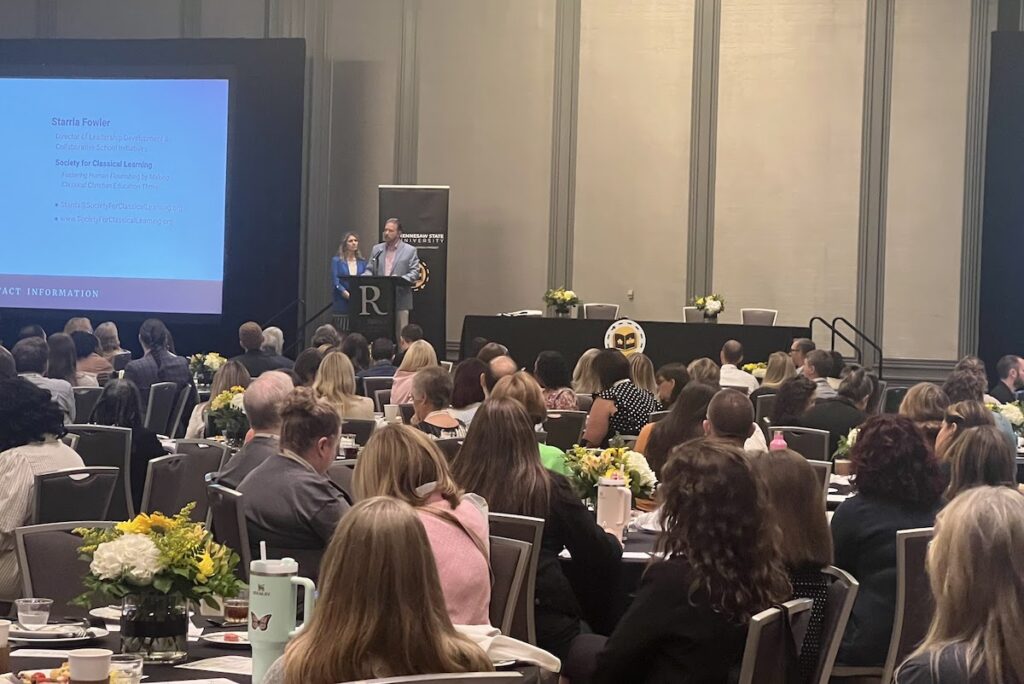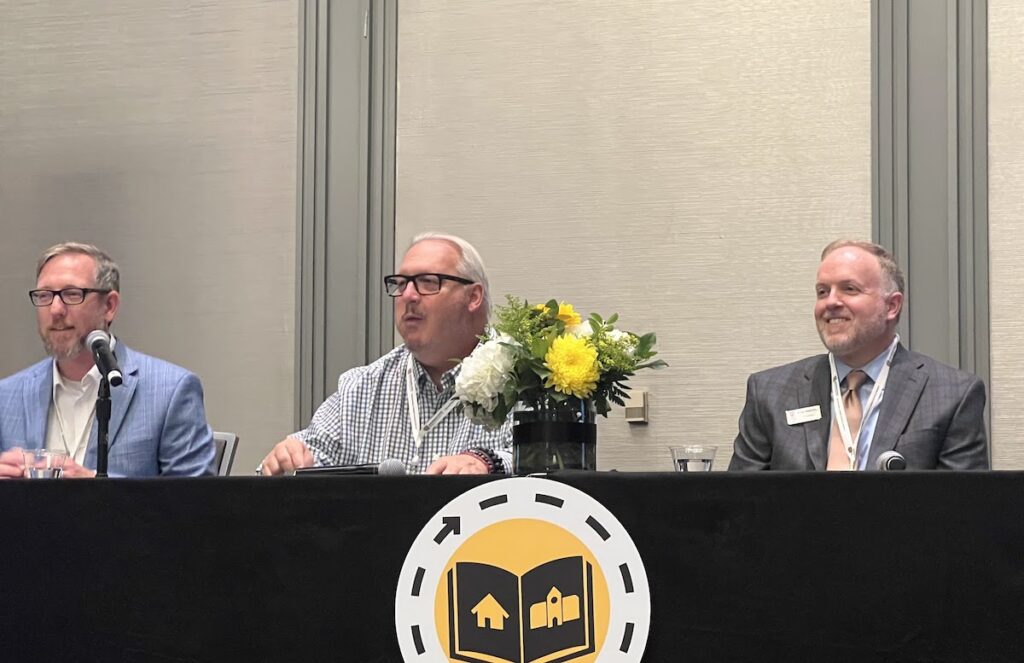
Elementary and high school students alike need opportunities to learn from their failures.
Hybrid schools help them do that.
That was one of the lessons that Florida resident Toni Frallicciardi imparted last week as she attended the 2024 National Hybrid Schools Conference.
Organizers held the event at the Renaissance Atlanta Waverly Hotel and Convention Center. They want to help parents and students develop new forms of K-12 schooling, outside the conventional education system.
“Most kids don’t learn in a traditional setting while sitting at a desk for six to eight hours a day in front of a chalkboard opening books. I think most kids learn by a hands-on project-based form of learning,” said Frallicciardi, who founded the Miami-based Surf Skate Science.
The school is a nonprofit that specializes in non-traditional education and caters to K-12 students in South Florida.
“It is one thing to go to school and learn about marine biology. You can learn about a shark in your marine biology class, but once you touch it and measure it and see that reaction in its habitat and learn what scientists in the field do then it is really exciting,” Frallicciardi said, adding this is what she calls hands-on learning.
“We try to expose kids to real life circumstances. [Through our program], kids learn to be imaginative. They learn to problem solve. They learn to be creative and resilient. I think kids learn a lot more from one day out in the field with a scientist than they do a semester in a classroom.”
Just as children and teenagers learn from their failures, so, too, must the adult hybrid school educators and parents. For Saturday’s convention, that was another key theme.
FAILURE AND THEN SUCCESS

Convention organizers said a hybrid school is one that meets a child’s individual needs and/or preferences, the same way a business caters to a customer’s personal needs.
Eric Wearne, a professor at Kennesaw State, said such schools can close more often than conventional schools.
In general, what most threatens a hybrid school’s longevity?
Robert Randolph, also a professor at Kennesaw State, answered the question this way: poor management.
Jon England, an education policy analyst at the Utah-based Libertas Institute, offered his perspective.
“You go from 10 to two students, and you are no longer financially viable. You can learn from it. You can ask ‘What did we do wrong that we can improve upon?’ There are things to be learned from that,” England said.
“Maybe it wasn’t the educational model. Maybe it was the fact that they never kept their books and didn’t pay attention to their accounting. Maybe it was because they didn’t fill out a 501C3 form all the way and didn’t check all the boxes.”
But are failing or closing schools a great concern?
Shiren Rattigan, who founded the Fort Lauderdale-based Colossal Academy, said no.
“Innovation comes with a lot of innovation and a lot of bad and sometimes silly looking innovation,” Rattigan said.
“We will put people in planes, and they go in the air and fly. Think of DaVinci’s drawings [of flying machines]. How many of the models failed?”
As England put it, if schools in the public system fail academically then they are prone to get more taxpayer money, regardless.
“That’s a different incentive, England said.
“They don’t need to do anything too drastic because they are not in the danger of shutting down.”
Randolph said it’s best to measure success by your competitors.
“A shared understanding of what success looks like is essential for entrepreneurs,” Randolph said.
“If you don’t know what successful education looks like, what you are investing in, the capabilities, or opportunities you are pursuing and if you don’t know what the good outcomes are then how do you know that you are doing well? How do you know what needs correcting?”
CATO Institute Policy Analyst Colleen Hroncich said that a bad school closing is not a failure.
“A bad school graduating kids who cannot read is a failure,” Hroncich said.
‘THE SMALL LITTLE RAGTAG BAND OF MALCONTENTS’

In the 1980s homeschooling was still very much in the shadows. But by 1992, every state had passed bills that made homeschooling legal. One year later, President Bill Clinton signed the Religious Freedom Restoration Act, which sent the number of homeschooling students up to 750,000 by 1995.
Yes. Every Kid. Foundation Vice President Michael Donnelly said that in 40 years homeschooling has come a long way.
“They [government officials] have been pulling off regulations left and right, which is counterintuitive. How did that happen? The small little ragtag band of malcontent rebel homeschool parents…how did they do that?” Donnelly asked.
“They are a tiny fraction of the population, yet they are a force of nature. Go to any state capitol and say ‘homeschool.’ And they go ‘Oh, oh. What? Are the homeschoolers not happy? What do we need to do to make the homeschoolers happy?’ Just tell me, and we’ll do it. I may be exaggerating a little bit.”
Currently, educators at hybrid schools want policy changes that will make it easier for their jobs to exist.
In the 2021 legislative session, Georgia was the first state in the nation to pass legislation that prohibits state regulation of learning pods. Georgia’s Learning Pods Protection Act defines learning pods in the Georgia Code and clarifies that they are not schools or child-care centers and should not be regulated as such. They are exempt from, among other things, staffing ratios and certification requirements.
Donnelly recommended that hybrid school parents and educators make it their business to know their state legislators.
“Legislators want to be liked, they like to be liked, they don’t want controversy, and when that happens there is this echo,” Donnelly said.
“The legislators ask you what can they do to keep the homeschoolers happy? Legislators don’t want controversy.”
Donnelly also suggested that hybrid school parents and educators connect with like-minded people and form coalitions or leadership organizations.
The Georgia General Assembly just passed the Promise Scholarship Act, providing families with state-funded scholarships to be used toward a non-public education of their choice.
Georgia Public Policy Foundation President Kyle Wingfield said, “We will work on it in the future to try to expand and make it better.”
Wingfield said the public will see how things with a new policy work.
“Then we need those of you who are on the ground who are doing these things to come to us and say ‘Hey, the way this is getting done is not going to work for us,’” Wingfield said.
“The thing that is next is how do we make the things that we put in place work better for the practitioners?”
Frallicciardi said she got a lot out of the convention and will take what she learned back to Miami.
“I am very excited that there is a place that is focused on the possibilities of education,” Frallicciardi said.
“I see a huge shift happening for future generations. What will that look like? Everything is progressing so quickly with technology that we don’t know what it will look like in 25 years. I am excited to see what happens.”